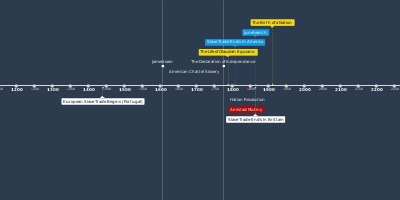jan 1, 1662 - Partus sequitur ventrem
Description:
Partus sequitur ventrem (Latin for "that which is brought forth follows the belly (womb)"),[1] often abbreviated to partus, was a legal doctrine concerning the slave or free status of children born in the English royal colonies. Incorporated into legislation in the British American colonies and later in the United States, partus held that the legal status of a child followed that of his or her mother. Thus, any child born to an enslaved woman was born into slavery, regardless of the ancestry or citizenship of the father. This principle was widely adopted into the laws regarding slavery in the colonies and the following United States, eliminating financial responsibility of fathers for children born into slavery.Prior to the adoption of the doctrine in the English colonies in 1662, beginning in Virginia, English common law had held that among English subjects, a child's basic legal status followed the father, based on the concept that a married couple were a unit headed by the father. The community could require the father to acknowledge illegitimate children and provide some support for them, and arrange for apprenticeships so the children were assured of learning a means of self-support. Courts wanted the fathers to take responsibility so the community did not have to support the children.
Added to timeline:
Date:
jan 1, 1662
Now
~ 364 years ago
